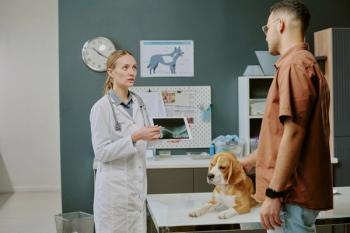
Examining the properties of probiotics (Sponsored by Iams)
Dr. Sanderson answers these questions about probiotics: What are probiotics? Is it better to administer a multi-species strain probiotic product or a single-species strain product? Can yogurt be used as an alternative to commercial bacterial probiotics in dogs and cats? How can probiotics potentially lessen our reliance on antibiotics for promoting and maintaining health in dogs and cats?
1. What are probiotics?
Probiotics are living microorganisms, most commonly bacteria, which, when administered in adequate numbers, exert health benefits to the host. These benefits include, but are not limited to, the potential to modulate and strengthen the immune system, inhibit growth of harmful pathogenic bacteria through competition for nutritional resources and adhesion sites in the gastrointestinal tract, and antagonize pathogenic bacteria through the production of antimicrobial substances.
Sherry Sanderson, DVM
But in order to have the opportunity to exert these benefits, probiotics first need to survive commercial processing, storage, and transit through the highly acidic environment in the stomach to ensure adequate numbers of viable organisms reach appropriate sites in the gastrointestinal tract and are able to adhere to intestinal epithelial cells and transiently colonize the gut. The most common bacteria with the potential to enhance a pet's health are the lactic acid producing bacteria, such as lactobacilli and bifidobacteria.
2. Is it better to administer a multi-species strain probiotic product or a single-species strain product?
All probiotics are not alike. The potential health benefits from a probiotic depend on the species and strain of probiotic used, as well as the number of viable microorganisms reaching target sites in the gastrointestinal tract. Probiotic organisms derived from the same species as the target species exhibit host-specificity and may better adhere to intestinal cells and transiently colonize the gastrointestinal tract than those derived from a different species.
The fact that a probiotic product contains multiple strains of bacteria or yeast does not necessarily make it superior to a single-strain product if there are inadequate numbers of viable organisms in the multiple strain product or the organisms have not been shown to confer health benefits in the species for which it is intended.
3. Can yogurt be used as an alternative to commercial bacterial probiotics in dogs and cats?
Not all yogurts contain live bacteria; some are pasteurized, killing the bacteria. In addition, the two most common bacteria found in yogurt are Streptococcus thermophilus and Lactobacillus delbrueckii, subspecies bulgaricus. Neither of these bacteria occur naturally in the gastrointestinal tract of dogs, and although yogurt containing these bacteria may be beneficial in people, similar benefits may not be observed when administered to dogs and cats.
An additional hindrance to using yogurt as an alternative to commercial bacterial probiotics in dogs and cats is the number of bacteria present in yogurt. In 2000, the Dairy Council of California estimated that 3.5 cups of yogurt would need to be consumed daily to reach effective numbers of bacteria in the gastrointestinal tract, which is not practical in dogs and cats.
4. How can probiotics potentially lessen our reliance on antibiotics for promoting and maintaining health in dogs and cats?
For decades, research has focused on fighting harmful bacteria in the body, primarily through use of antibiotics. Although antibiotics are often effective at killing pathogenic and harmful bacteria, they are not without problems. For example, antibiotics are not selective and kill beneficial bacteria as well as harmful bacteria, and it is not uncommon for patients to develop diarrhea while receiving oral antibiotics.
A potential consequence of heavy reliance on antibiotics to control harmful bacterial infections is the development of strains of bacteria with resistance to many commonly prescribed antibiotics. The ever-increasing number of infections with antibiotic-resistant bacteria is causing some to investigate alternatives to antibiotics. Probiotics provide a proactive approach to health concerns that may lessen reliance on antibiotics and reduce potential undesirable side effects associated with the use of antibiotics.
It is becoming increasingly clear that beneficial bacteria play a crucial role in maintaining overall health and well-being of pets, and probiotics are beneficial bacteria.
Newsletter
From exam room tips to practice management insights, get trusted veterinary news delivered straight to your inbox—subscribe to dvm360.




